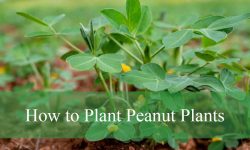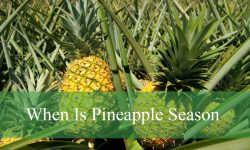White carrot varieties are becoming popular among gardeners and cooks because they come in a variety of flavors and textures in addition to their distinctive colors. These attractive white carrot varieties will spice up your dishes with their unique blend of spicy, sweet and nutty properties. White carrots are rich in minerals, vitamin A, macronutrients and phytonutrients.
How do White Carrots Taste?
White carrots, as the name implies, are a unique variety that are distinctly pale white in color rather than the typical orange hue. Although orange carrots are the most commonly recognized kind, white carrots present a distinctive variation in terms of appearance and culinary possibilities.
These carrots stand out from their colorful relatives, to whom they are botanically related and share many characteristics, thanks to their striking white look. White carrots are famous for their crisp texture and often have a somewhat different flavor profile from other types.
Different types of White Carrots
Maruschka White Carrot
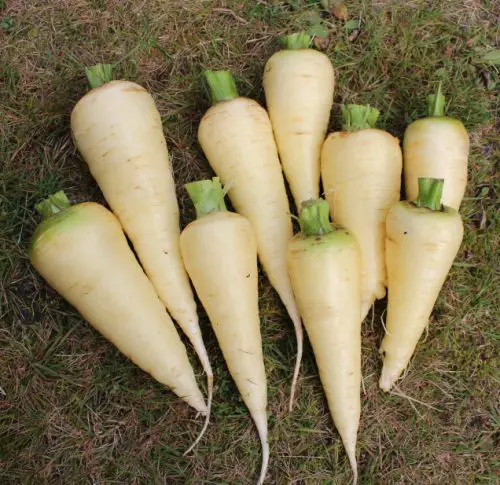
Maruschka white carrot, a distinctive non-traditional variant, captivate attention not only for their unique color but also for their unparalleled flavor and versatile culinary applications. These carrots stand out with a crisp texture and a mild flavor, making them an excellent choice for fresh salads and coleslaws, adding a delightful and unexpected twist to these dishes.
What makes Maruschka particularly appealing is not just its culinary prowess but also its ease of cultivation. These white carrots are remarkably easy to grow, making them an accessible choice for gardeners of all levels of expertise. To ensure optimal growth, it is recommended to maintain a soil pH between 6.0 and 7.0. Loving Maruschka in the kitchen and garden will be a memorable and fulfilling experience for anyone who enjoys experimenting with food preparation and home gardening.
Kuttinger White Carrot
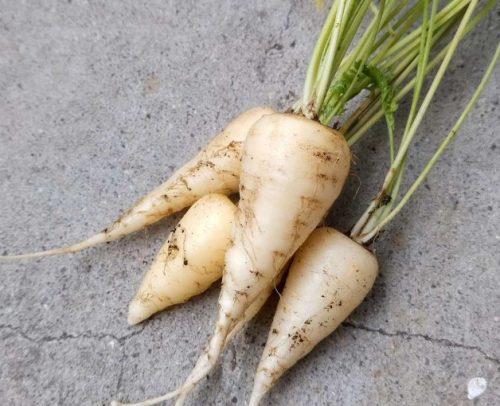
Kuttinger white carrots, a little-known variety of carrot, are especially attractive to gardeners because of their high nutritional value and delicate color. These carrots are naturally sweet and easy to prepare in everyday dishes. The unique flavor of Kuttinger white carrots adds an exciting twist to culinary creations, offering a refreshing alternative to traditional orange carrots.
For those who want to try growing these special carrots, optimal growing conditions are sandy loam, well-drained soil, and full sun exposure.
White Belgium Carrot
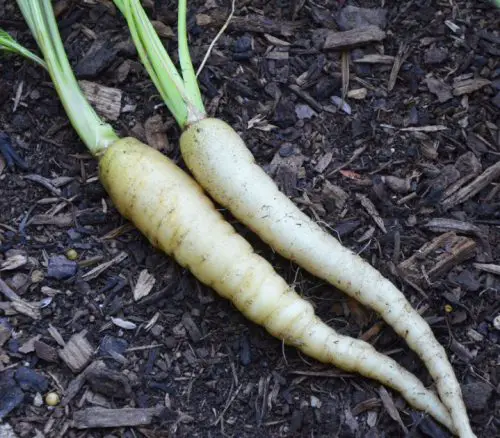
The Belgian White carrot, scientifically known as Daucus carota ‘White Belgium,’ is a distinguished heirloom variety originating from Belgium, celebrated for its high sugar content and unique, earthy flavor. This culinary gem thrives in cool climates and slightly acidic soil, showcasing its versatility in both cultivation and kitchen applications.
With a creamy white exterior and a tender interior, the White Belgium carrot boasts a moderately sweet taste with a delightful hint of earthiness. Its flavor profile reaches new heights when cooked, making it an excellent choice for steaming or glazing. Traditionally cherished in Belgian and Dutch cuisine, this carrot shines in soups and stews, adding a touch of sweetness and sophistication to culinary creations.
Snow White Carrot
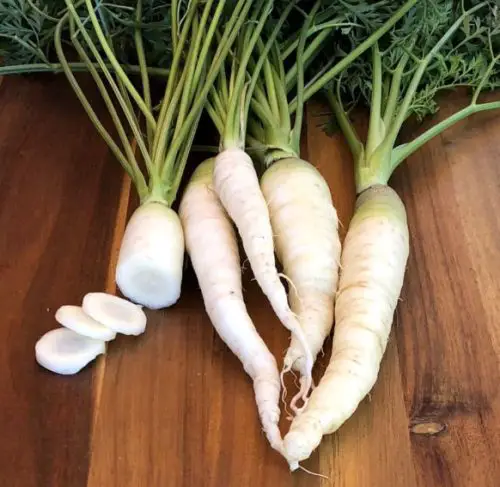
The Snow White Carrot, scientifically identified as Daucus carota ‘Snow White,’ is renowned for its exceptional sweetness and crisp texture, making it a standout choice in the world of carrot varieties. Slightly shorter, averaging 6-7 inches compared to its Lunar White counterpart, this carrot is a culinary delight.
Thriving in loamy, rich soil with good drainage, the Snow White Carrot offers a mild sweetness, distinct from earthier varieties. Boasting a brilliant white hue, these carrots elevate dishes where their color can shine, such as cream-based soups and mashed potato blends. Preferring slightly acidic to neutral soil, Snow White Carrots are ready for harvest in approximately 70 days, making them a delightful addition to gardens and culinary creations alike.
Lunar White Carrot
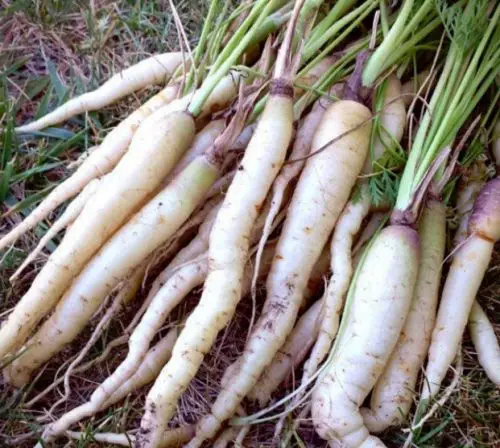
The Lunar White Carrot, scientifically known as Daucus carota ‘Lunar White,’ presents a non-GMO variety celebrated for its sweet and mild flavor, typically reaching lengths of up to 8 inches. This carrot variety holds a special place in the culinary world.
With a mild sweetness and crisp texture, Lunar White Carrots are perfect for a variety of culinary applications. Ideal for stews, salads, and snacking, they offer versatility in the kitchen. Boasting smooth, cream-colored skin, these carrots lend a mild, sweet flavor to dishes, making them particularly popular in salads and Asian cuisine, where they pair harmoniously with light dressings and herbs.
Suited for sandy, well-drained soil, the Lunar White Carrot is a low-maintenance yet rewarding addition to gardens, ready for harvest in about 65 days.
Icicle Carrot
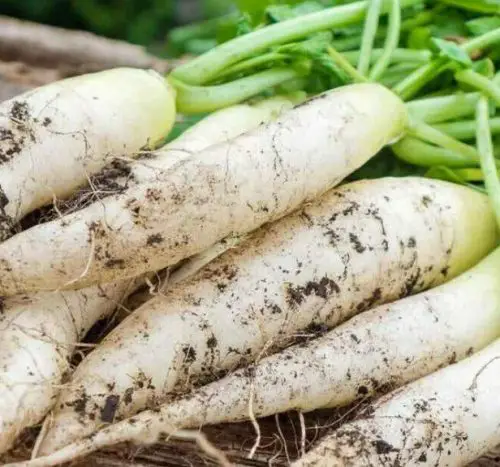
The Icicle Carrot, scientifically known as Daucus carota ‘Icicle,’ introduces a distinctive addition to the carrot family with its unique characteristics. This carrot variety showcases a narrow, tapering shape, emphasizing its pungent and spicy taste. Renowned for its slightly sweet flavor with earthy undertones, the Icicle Carrot finds its culinary niche in pickling and recipes that demand a crisp texture, such as slaws and salads.
To cultivate these flavorful carrots successfully, opt for deep, well-aerated soil, ensuring optimal growth conditions. With a relatively quick harvest period of 60-70 days, the Icicle Carrot stands out as a versatile and flavorful option for both culinary enthusiasts and gardening aficionados alike.
Albino Carrot
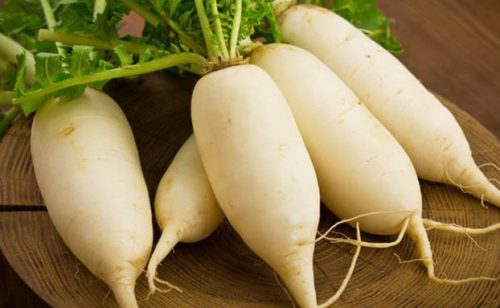
The Albino Carrot, scientifically identified as Daucus carota ‘Albino,’ offers a distinctive twist to the traditional carrot experience. Characterized by its unique ivory-white coloration, this carrot variety is a true standout in both appearance and taste. With a mild sweetness, though less flavorful than orange varieties, Albino Carrots bring a subtle and refreshing flavor to the palate.
Boasting a crisp texture, Albino Carrots prove to be a delightful addition to salads or as a raw vegetable dipper, showcasing their versatility in various culinary creations. Thriving in cool climates and well-drained soil, these carrots require conditions that complement their unique attributes. With a typical harvest time of 60-65 days, the Albino Carrot invites both gardeners and culinary enthusiasts to indulge in its distinct and palate-pleasing qualities.
White Satin Carrot
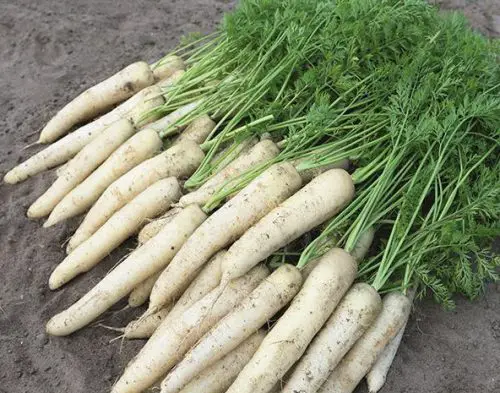
The White Satin Carrot, scientifically known as Daucus carota ‘White Satin,’ presents a perfect addition to the carrot family with its unique attributes. With a flavor profile characterized by a slight sweetness and a somewhat woody undertone, these carrots offer a distinctive taste experience.
Long and slender, the White Satin Carrot boasts a glossy, snow-white appearance, adding an elegant touch to any culinary creation. Versatile in the kitchen, these carrots find their sweet spot in European dishes like stews and root vegetable medleys, enhancing the flavors with their unique characteristics. Cultivate them in well-drained soil, and anticipate a rewarding harvest in approximately 70-75 days. The White Satin Carrot beckons both gardeners and culinary enthusiasts to explore its unique qualities and elevate their dishes with its distinct flavor profile.
A guide for growing White Carrots
Growing White Carrots, whether they are specific varieties like Lunar White, Icicle, Albino, or White Satin, follows general guidelines for carrot cultivation. Here’s a basic guide on how to grow White Carrots:
Select the Right Variety
Choose the specific variety of White Carrot you want to grow based on your preference for flavor, size, and culinary use.
Prepare the Soil
White Carrots typically prefer well-drained, loose soil. Ensure the soil is free from rocks and debris to allow for smooth root growth. Amend the soil with organic matter, such as compost, to improve fertility.
Sowing Seeds
Sow White Carrot seeds directly into the garden bed. Plant the seeds about 1/4 to 1/2 inch deep. Space the rows about 12 to 18 inches apart to provide ample room for the carrots to grow.
Watering
Keep the soil consistently moist, especially during the germination period. Carrots require regular watering for even and steady growth.
Thinning
Once the seedlings are a few inches tall, thin them to ensure proper spacing. Carrots need adequate space to develop well-formed roots. Thinning helps prevent overcrowding and competition for nutrients.
Fertilization
Avoid using excessive amounts of nitrogen, as this can lead to forked or misshapen roots. A balanced fertilizer or one with slightly higher phosphorus is suitable.
Weed Control
Keep the garden bed weed-free to reduce competition for nutrients. Be gentle when weeding to avoid damaging the carrot roots.
Harvesting
White Carrots are usually ready for harvest in 60-75 days, depending on the variety. Harvest when the carrots have reached the desired size. Gently loosen the soil around the roots and pull them up.
Storage
Store harvested White Carrots in a cool, humid environment. They can be stored in the refrigerator for short periods or in a root cellar for longer-term storage.
Pest and Disease Management
Monitor for pests such as carrot flies and practice crop rotation to minimize the risk of diseases.
By following these general guidelines, you can cultivate healthy and flavorful White Carrots in your garden. Adjust specific details based on the particular variety of White Carrot you choose to grow.
People Who Read This Also Read:



